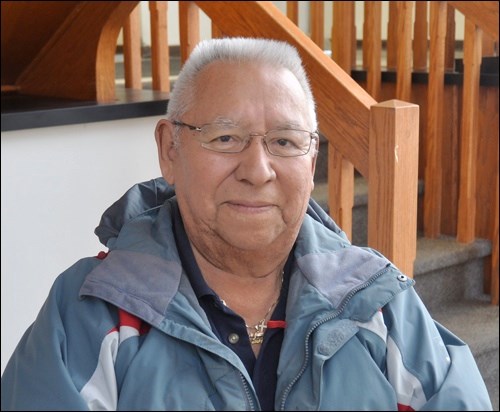Little Pine First Nation members have undertaken a series of seminars aimed at reclaiming their community as a safe home for their people.
The seminars are addressing issues such as drug and alcohol abuse, crime, policing, jurisdictional issues and conflict resolution. The goal is to bring out discussion on crime patterns and access to justice in the criminal justice system.
Out of a seminar held Oct. 22, a series of recommendations has been made, and a second seminar is scheduled for Nov. 24.
The announcement of the second meeting states, “This seminar is for you if you are frustrated by the crime and lawlessness in our community. This seminar will help you gain knowledge and skill to understand crime, the criminal justice system [and] crime prevention …”
Seminar leader Jacob Pete says the first meeting was sponsored by Little Pine’s chief and council. It was facilitated by Richard Checkosis, councillor in charge of justice, and Pete served as seminar leader.
"I'm also a member of the band. I have very extensive experience doing this stuff," said the retired businessman, consultant, writer and ceremonial elder.
"We've got some pretty innovative things coming out of there," he said of the first meeting.
It was suggested the long-term solution to the safety issues Little Pine now faces is to return to traditional ways, traditional ceremonies and traditional beliefs of raising families.
"Our families have strayed away from how our grandparents raised their families. Our family units were complete family units. Our families were independent and did not rely on government rations or relief. Everyone had a role to play in the interactions among our relatives," it was said.
The first seminar was attended by 24 elders, seven students and six community members, plus two RCMP members. Representatives of the Battlefords Tribal Council's department of justice also attended, making presentations on its Extra Judicial Measures Program.
The elders who attended are calling for more involvement and hope to have more women, especially, at the next meeting. They are also calling for attendance by all social and health support agencies and services to help prepare a Strategic Community Plan on Public Safety.
A key issue is drug crime, including trafficking and even shootings. One of the recommendations is to have the band research and create a banishment bylaw for drug dealers that would remove them from band-owned houses, turn off their power and water and possibly banish them entirely from the community.
"They are doing too much harm to our young people," was one comment.
Banishment, Pete told the Regional Optimistlast week, was used in the past by the community as a way of dealing with individuals who caused trouble, even up to and including murder.
Now, he said, when someone gets into serious trouble he is not banished from the reserve. Instead he goes to jail as a form of punishment, never having to face the people he has harmed. He serves his time and comes back to the reserve like nothing has happened.
"We are forgetting our traditions and culture," Pete told the meeting. "There was a reason for why we did this. Our grandfathers and other relatives made sure we understood the consequences of any bad act that was done."
The meeting was told banishment has been trialed at Thunderchild First Nation, where elders use a horse camp to take care of youth, with lectures, sweats and lifestyle changes, and at Lac La Ronge, where banishment is to an island away from the community. Offenders are reintroduced to nature and survival lifestyle changes. The also heard about a reserve in Manitoba that has a system of cultural camps for young offenders where they are removed from the community, introduced to traditional ways and required to fast, meditate alone for four days and experience a vision quest.
It was said cultural camps for Little Pine members must be supervised by community elders who know local Battle River Cree culture, traditions and spirituality. In the past, cultural camps have been co-ordinated by "drunks, druggies and womanizers," it was noted.
Drug and alcohol abuse is another key issue. A number of elders live alone and worry about the drinking, parties, assaults, break-ins and threats going on around them. They worry about children raising themselves while parents are away every night. They also say all of the reserve's families have been guilty of some of the things happening in the community. Some elders themselves, it was said, have been implicated in alcohol abuse and sexual exploitation.
Among the presentations at the seminar was a statistical report by Sgt. Heath Robinson of the Cut Knife RCMP detachment and Cpl. Steve Klimenhaga, "F" Division Aboriginal Policing Service.
Comments from the community members included frustration with lack of response on complaints, while RCMP indicated some of the activities the community feels police aren't acting on are not reported.
One of the recommendations out of the meeting was that the band chief and council create public safety officers to provide complementary services to the RCMP for Little Pine, providing safety, security and patrol of band-owned properties and for the protection of elders and their homes.
Other recommendations were:
• a substance abuse testing program for band staff and teachers;
• a curfew bylaw;
• evening public recreation events at the school gymnasium;
• the establishment of a school intramural basketball program;
• appointment by chief and council of persons to the community consultative group (CCG), in compliance with the policing agreement with the RCMP, and to a Justice Committee for Little Pine;
• facilitate presentations by elders at Chief Little Pine School;
• establish restorative justice services with a justice reinvestment approach program for trouble youth; and
• establish a restorative justice commission and provide training in restorative justice and alternative dispute resolution.



